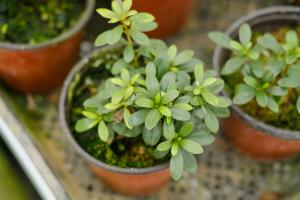Should You Use Bone Meal When Planting Trees
When it comes to planting trees, there are many factors to consider, such as sunlight, water, soil type, and fertilizers. One popular fertilizer option is bone meal, but is it really necessary? In this article, we'll explore the potential benefits and drawbacks of using bone meal for tree planting.
What is Bone Meal?
Bone meal is a type of organic fertilizer made from crushed animal bones, usually beef bones. It is rich in phosphorus, which is an essential nutrient for plant growth and development. Bone meal also contains small amounts of nitrogen and calcium.
The Benefits of Using Bone Meal
Using bone meal as a fertilizer can offer several benefits, including:
Increased phosphorus levels: Phosphorus is critical for root development and overall plant growth. Bone meal can provide a slow-release source of phosphorus, which helps plants establish strong root systems.
Better bloom and fruit production: Phosphorus is also important for flower and fruit production. Using bone meal can result in more abundant and colorful blooms, as well as higher yields of fruits and vegetables.
Natural and organic: Bone meal is a natural and organic fertilizer, which makes it a popular choice for those who want to avoid synthetic chemicals in their gardening practices.
The Risks of Using Bone Meal
While bone meal can offer some benefits, there are also potential risks to consider, including:
Phosphorus runoff: If too much bone meal is applied, it can lead to excess phosphorus in the soil. This can eventually leach into groundwater and contribute to water pollution.
Incomplete decomposition: Bone meal can take a long time to decompose, which can tie up nutrients in the soil and limit the availability of other important nutrients for plant growth.
Potential for bone disease transmission: There is a small risk of transmission of prion diseases, such as mad cow disease, from the use of bone meal. However, the risk is considered low if the bone meal is properly sterilized during production.
When to Use Bone Meal
Given the potential risks of using bone meal, it's important to use it judiciously and appropriately. Here are some guidelines for when to use bone meal:
Before planting: Adding bone meal to the planting hole can provide a slow-release source of phosphorus for the young tree as it establishes its root system.
In moderation: Use bone meal sparingly, as too much can lead to excess phosphorus buildup in the soil.
In combination with other fertilizers: Whenever possible, use bone meal in combination with other types of fertilizers to provide a balanced nutrient profile for the tree.
Alternatives to Bone Meal
If you're hesitant to use bone meal for your tree planting, there are other alternatives to consider, such as:
Compost: Compost is a natural and organic fertilizer that can provide a wide range of nutrients for plant growth. It also improves soil structure and water-holding capacity.
Commercial fertilizers: There are many commercial fertilizers on the market that are formulated specifically for trees and shrubs. Look for products that contain a balanced mix of nutrients, including nitrogen, phosphorus, and potassium.
Cover crops: Planting cover crops, such as clover or rye, can help build soil fertility and structure over time. Cover crops can also help suppress weeds and improve soil moisture retention.
The Bottom Line
So, should you use bone meal when planting trees? The answer ultimately depends on your specific soil and plant needs, as well as your overall gardening philosophy. While bone meal can offer some benefits, it's important to use it judiciously and appropriately to avoid potential risks. If you're unsure about using bone meal, consult with a gardening expert or consider alternative fertilizers to meet your tree planting needs.

 how many times do yo...
how many times do yo... how many planted tre...
how many planted tre... how many pine trees ...
how many pine trees ... how many pecan trees...
how many pecan trees... how many plants comp...
how many plants comp... how many plants can ...
how many plants can ... how many plants and ...
how many plants and ... how many pepper plan...
how many pepper plan...































